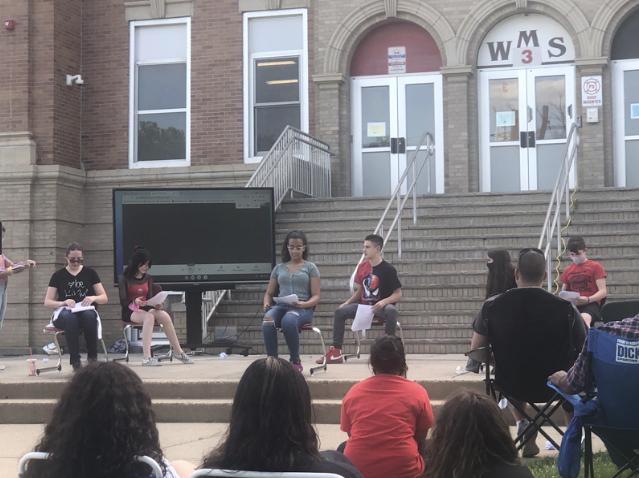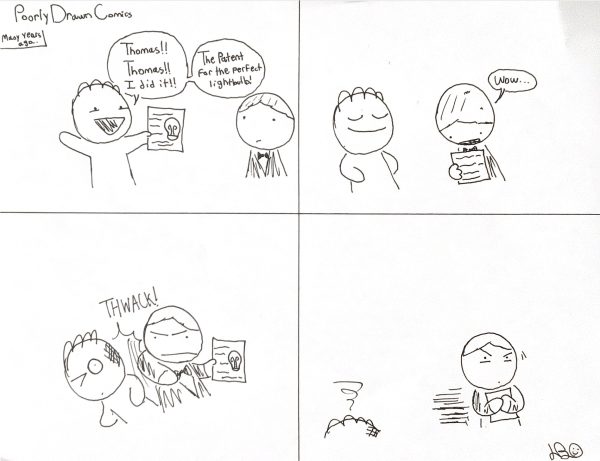3 Easy Tips to Manage Your Stage Fright
WMS HAS GOT TALENT: Here are the brave actors in Drama Club, performing on the main steps of Woodbridge Middle
Jun 14, 2021
Glossophobia, more commonly known as stage fright, is one of the most common phobias in the world with over 73% of the population having to face it. Some people even fear it over death! It is something everyone is forced to deal with whether it’s presenting in front of a class, showcasing a talent, playing a sport at a game, or simply just being in front of large crowds. Even I have struggled with freezing up on stage out of fear. But even though it may feel overwhelming during the moment, there are many ways to help calm your nerves and make you appear calm and confident even if you aren’t.
What is stage fright?
There can be many forms of glossophobia. While one may only feel anxiety when speaking or performing live on stage, others may also become nervous while on camera. No matter what form of stage fright someone may have, it can have damaging effects on their social skills, mental health, and self-esteem.
Some of the triggers for stage fright are an unrealistic view on what people are expecting of you, overthinking things and not focusing on the present, and overdramatizing mistakes. By avoiding these things, you can dramatically improve your confidence performing over time.
There are three common levels of symptoms caused by performance anxiety. The first level, physiological, causes things like sweaty palms, nausea, headaches, chills, and changed heart rate. The next level, cognitive, leads to mental confusion and congestion. Lastly, the behavioral level may create one to stutter, freeze up, or run off.
Luckily, there are three easy things that you can do to manage your stage fright and gain confidence.
Tip #1: BE PREPARED AND HAVE LOTS OF PRACTICE!
The first tip on how to manage stage fright is to make sure you are prepared for the event. Even though the nerves will definitely still be there, making sure you know what you are doing will give you a sense of safety and will prevent you from freezing up.
Woodbridge Middle School teacher and Drama Club head Mrs.Liastro agrees saying that, “Practice definitely helps to calm people’s nerves. In any situation – the more prepared you are, the better you perform under pressure.”
Being that she has run the drama club for years, she has lots of experience dealing with the fear of her students before getting up on stage, and knows how to better prepare them to not be nervous leading up to a performance. She believes that “… it helps our actors and stage crew to run through the skit as many times as we can so they know what to expect when they are on stage.”
This advice will definitely be helpful to anyone who struggles with their mind going blank during a show. Keep practicing and there will be nothing to worry about. It will be like second nature to you!
Tip #2: START SMALL AND WORK YOUR WAY UP
When learning how to get rid of nerves in front of large crowds, it is best to start getting used to smaller audiences first.
Try practicing in front of your parents, siblings, grandparents, or anyone in your family that you feel closest to. This way, you will get used to the feeling of performing while not worrying about judgment from the audience. You can also try asking them to give you tips and constructive criticism at the end of your performance in order to do better leading up to bigger crowds.
Next, try moving your way up to friends. This is a good way to start getting used to performing in front of people who aren’t super close to you because when performing with large crowds, most likely you won’t know most of the people there. Just like with family, you can practice in front of friends without being too worried and can ask about what you should change about your performance.
Lastly, start performing on stages. Now that you are already used to performing in front of small audiences, performing on stage should be less difficult than it was before. And the more you keep performing with larger and larger crowds, the less nervous you will get each time.
Tip #3: FAKE IT TIL’ YOU MAKE IT
An easy way to look confident on stage is to FEEL confident on stage. Even if it’s fake, it will give everyone the impression that you aren’t nervous and will improve your performance entirely.
Ashley Vincent, a choir student at Woodbridge Highschool, says, “ …I do this all the time, especially when I was originally auditioning for choir. I think everyone does this honestly and it usually works.”
Not only will this method help you look confident, it is also known to actually improve your confidence in the future! Nerves are really just all in your head. By faking confidence, it will trick your brain into thinking it’s real.
Overall, managing your stage fright can be done in three easy steps: Practicing, getting used to performances, and faking confidence. Even though you may still get nervous, just believe that you will do well and it will happen!





